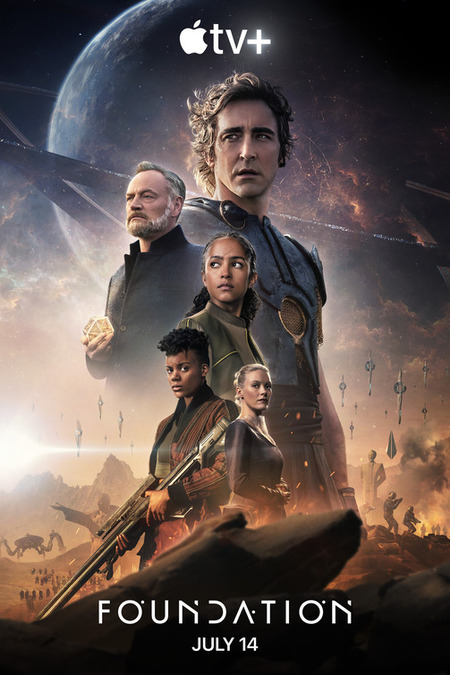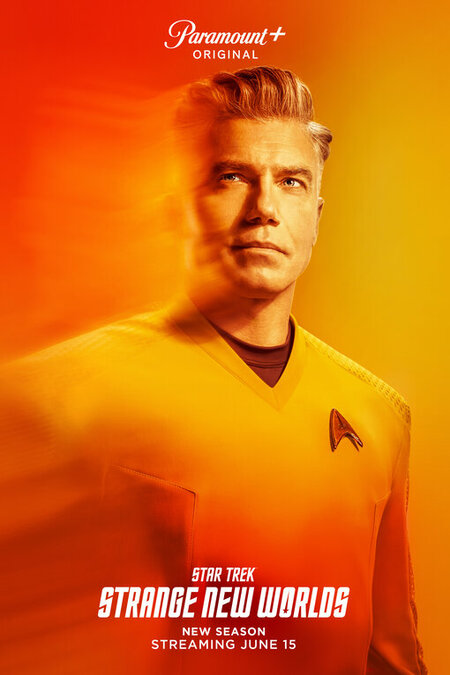(courtesy IMP Awards)
Foundation (S2, E1)
Cataclysm in slow motion is once again the order of the day as Foundation, base don the work of the great Isaac Asimov ushers in its second season with “In Seldon’s Shadow”.
A show known for its lush nuanced stroll towards a civilisational apocalypse has not deviated from its slow air of creeping destruction, and remains all the better for it because, after all, natural disasters and accidents of an industrial kind aside, most misery which befalls humanity actually happens very slowly, almost like an accident in slo-mo, and often against the background of the reality people have always known.
Hollywood blockbusters would have us believe, and let’s be fair, we flock to the cinema to see it happen this way, that the end of big and sprawling things is instant and cataclysmically monstrous, but the truth is, even a Milky Way-spanning empire such as the one ruled over by Brother Day aka Empire (Lee Pace) and his cloned siblings, Dusk (Terrence Mann) and Dawn (Cassian Bilton), falls slowly, planet by planet, and not in a consuming fire of the end of the end of all things.
But rest assured, the end is most certainly on its way, something that Gail Dornick (Lou Llobell), the onetime protégé of Hari Seldon (Jared Harris), knows all too well, calmly and sagely informing viewers using the meditatively thoughtful delivery that has come to characterise many modern dramas, that the Foundation which Seldon founded, and which predicts the fall of man into multi-millennia long oblivion (yes, he’d be a cheery guy to have at parties!), is on the march and the empire which seems so strong and impervious is crumbling bit by frequently dislodged bit.
The goal of the Foundation? To make sure that when the empire does indeed fall that it does take humanity right along with it, and that various inflection points of human history that could spell ruinous collective damnation, don’t come to fruition.
It’s a huge ask when the empire in question sprawls over 10s of 1000s of planets and systems but such is Seldon’s arrogance, admittedly now much-diminished, that he believe his algorithmic system known as “psychohistory” can not only predict what will happen but avert it too.
At this point though, we are bearing witness to a regrouping of the forces – Brother Day grows ever more paranoid, dodging assassins and accusing everyone, including Dusk and Dawn of simmering disloyalty while Synnax-based Gail, and Salvor Hardin (Leah Harvey), with whom she shares an extraordinary link (spoilers!), grappled with the fact that they have slept 138 years into the future and that everyone that known and love is, as Gail observes, with more than a little melancholy, is “behind them”.
The episode is essentially above getting ready for what lies ahead, which if Seldon is right, and he will assure you is – though for much of this episode he is trapped somewhere quite extraordinary and battling a host of inner and outer digital demons – will be massive indeed.
Lesser storytellers might be tempted to unleash all the bombastic hugeness at their disposal right now, lacing each episode with gargantuan displays of the ends of the displays, writ large across a collective cosmos, but Foundation is content to take its time and to get us soak in the tumult to come, to fully appreciate that it is slow decline that claims the great, empire or person (or here, both) not sudden ruin.
Quite often too as the end of things accelerates, as it appears to be doing in Foundation, it is the people who hold the power and who fear its diminishment, who end up essentially hastening their own demise.
They don’t to, of course – after all, who slits their own throat when a galaxy sits at their cossetted feet?
But inadvertently and indirectly, they do so, spooked by the impending loss of what was once unassailably theirs, and unable to think as calmly and clearly as they did, they make poor decisions, driven not by calm calculation and thoughtful forward planning but by a desperation driven need to shore things up and a panic which leads not to firm grounding but a quicksanding of the status quo.
You can see all this happening in this first mesmerisingly measured episode, which places as great a premium on slowly-drawn and realised characterisation as it does intricate, careful plotting and a sage understanding that all empires must fall; it’s just how it happens that’s different.
Quite whether the Foundation of the title can guarantee a soft landing is altogether another thing but with the null field on Terminus subsiding and sirens wailing that war with the empire is at hand, we are on our way to finding out and to learning all over again, with rich, thoughtful storytelling subsuming us in gloriously nuanced fashion, that nothing lasts forever and that it’s how the ending is handled that will consume everything from this point forward.
Foundation streams on Apple TV+
Strange New Worlds (S2, E4 & E5)
(courtesy IMP Awards)
As a franchise, Star Trek is in that wonderful position where it is able to be both gravely serious and goofy as anything and for these two wildly divergent elements to feel like organic parts of the same narrative whole.
The sillier side of things is on display in the animated Star Trek series Lower Decks whose writers have shown a real gift for being able to affectionately parody the franchise at the same time as they tell some emotionally resonant, meaningful stories – they can also, quite wonderfully, just being ridiculously, funnily off-the-wall just for the hell of it – while the more grave storytelling has two seen superlative outings in this season of Strange New Worlds (SNW), the recently-aired “Ad Astra per Aspera”, which saw Number One, Una Chin-Riley (Rebecca Romijn) on trial for hiding her true genetic identity, and one of the episodes up for review in this post, “Among the Lotus Eaters”.
In this episode, which cuts to the very heart of memory of loss and whether remembering what has hurt us deeply is a plus or a minus, Pike (Anson Mount), La’an Noonien-Singh (Christina Chong) and Doctor M’Benga (Babs Olusanmokun) beam down to Rigell VII, a planet first featured in Star Trek in The Original Series‘ episode, “The Cage”, to rectify some culture polluting wrongs.
Way back on that initial visit, first contact went very badly indeed with three crewmembers killed, including Pike’s own yeoman Zac (David Huynh) and lots of equipment was also left behind which has led to the people of the planet having tech way beyond their Bronze Age-equivalent present.
The away team heads down to do some cultural cleaning up only to find their memories and identity being leeched from them to the point where just a day later they have lost all everything bar what’s called “implicit” memory or deeply-learned skills and knowledge i.e. M’Benga doesn’t remember he’s in Starfleet or a doctor but he knows how to heal someone.
It’s frightening and debilitating and the only way Pike and the others survive is with the help of some fellow members of a work party they are assigned to by the rulers of the planet who, and you must watch to see why who they are matters so much, seem to be weirdly protected from the identity leeching.
While Pike and the gang do their best to survive the planet’s weird effects on them, the Enterprise crew are similarly affected to the point where no one is at their posts with everyone wandering around in a confused haze.
This gives star pilot Erica Ortegas (Melissa Navia) a well-deserved and much-delayed moment in the spotlight as she battles her own fears -and let’s face it, not knowing you are and why you’re somewhere would be frightening in the extreme – and pulls herself together enough to steer the ship out of trouble in the rubble-strewn zone around the planet.
They are two stories of identity and loss, with both characters, Pike and Ortegas fighting back furiously against the loss of who they are, and it stands as a well-wrought of how, while it’s difficult to handle the pain of loss and grief and impending fear (Pike knowing his destiny), it’s far preferable to living in ignorance of it, and losing so much more of yourself.
In starkly different and comedically rich contrast, but still with a healthy dose of meaning and again the importance of being faithful to your authentic self, and having others championing that too, is episode five, “Charades”, which draws its name from the fact that, stalling for time for reasons we will go into shortly, Spock (Ethan Peck sporting some seriously good comedy chops) convinces his prickly mother-in-law to be, T’Pril (Ellora Patnaik) that the game of the charades is a sacred rite on par with the Vulcan ones must observe exactly if he is to confirm his engagement to T’Pring (Gia Sandhu).
The only problem with him being a perfect Vulcan husband-to-be?
A shuttle accident involving wormholes, interdimensional beings (who may exist outside space and time but who have no idea what a multiracial person looks like) and some on-the-fly medical care leaves Spock 100% human which initially freaks him out until he leans right into it and lets his emotional freak flag fly.
He is also has a chance to better understand how challenging it has been for his mother Amanda (Mia Kirshner) to live within Vulcan society where she has been constantly judged and scorned by the highly xenophobic Vulcans, and it leads of real tender reconnection for mother and son.
In the midst of all this getting in touch with innate humanity, Nurse Chapel (Jess Bush), who has FEELINGS for Spock and can’t deny them any longer (yeah, the timing sucks) sets about, with the help of Uhura (Celia Rose Gooding) and Ortegas to get the interdimensional beings, who have all the care and understanding of others as worn-down call centre workers, to fix Spock back the way he was.
You might think Nurse Chapel would welcome a fully human Spock but she loves him in the totality of who he is and can’t stand by and leave him to become permanently human when it’s not who he really is.
That’s some serious riffing on identity and being loved for who you really are, but it’s all shoved inside an hilarious episode where T’Pril’s husband Sevet, who’s all enthusiastic and happy, has to tone himself down to keep his wife satisfied, and where Spock, bristling with an intensity of unbridled emotions he is ill-equipped, struggles to be Vulcan enough when he’s no longer (temporarily) Vulcan at all.
Even Pike gets in on the action, with some lovely pieces of slapstick humour that work a great in an episode that doesn’t take itself too seriously while also being very serious indeed.
It’s a perfect mix of the two elements Star Trek excels at, and these two episodes underscores how beautifully the franchise moves between the two and how it deeply enriches its overall storytelling to immensely pleasing and highly entertaining degrees.
Star Trek: Strange New Worlds is currently screening on Paramount+

